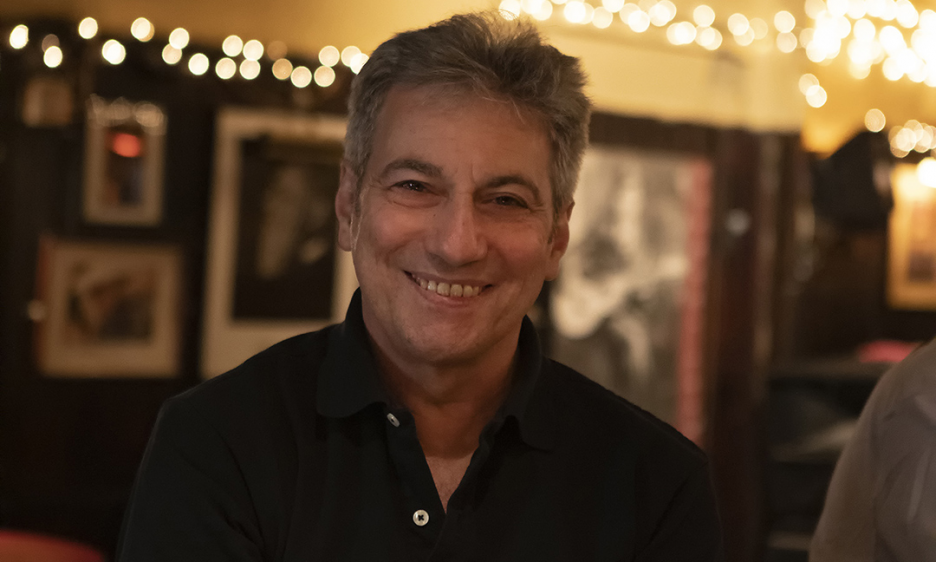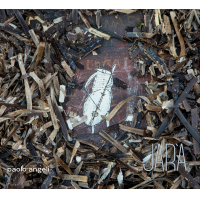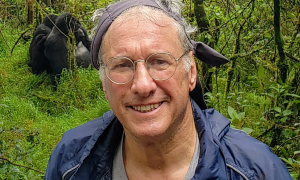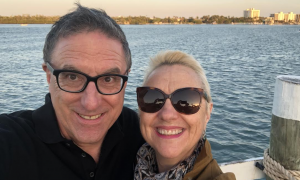Home » Jazz Articles » Out and About: The Super Fans » Meet Jack DiMonte
Meet Jack DiMonte

Courtesy Kyra Kverno
Unpredictability and humor make live music special. I don’t mean jokes or comedy—I mean, stuff happens in a live performance that no one knew was coming. The best performers acknowledge that 'what just happened' moment, and it makes that performance unique and never-to-be repeated. It's really one’s humanity, and living in the moment of the experience.
Tell us a bit about yourself.
I grew up in central New Jersey, just outside of Princeton, which gave us access to both New York and Philadelphia radio and TV stations. A DJ in Philly named Sid Mark had a show on Friday nights called "Fridays With Frank," which was three solid hours of Frank Sinatra, with another four hours on Sundays. I started listening to that when I was in high school; I wasn't trying to learn the songs, but just by hearing them over and over they started to sink into my brain. Since Sinatra recorded so many of the great standards I was unconsciously soaking up melodies and lyrics. I didn't know who the writers were; that came later. In 1978 I moved to New York to pursue acting, which I did for several years. I lucked out with a rent-stabilized apartment on the Upper West Side, which is where I still live. I work at a law firm doing capital markets research, which I've done for over 20 years.What's your earliest memory of music?
I'm not really sure, but I do remember that we had a record player, and played a lot of 45s that my parents bought. A lot of them were what was popular at the time, but I also remember that some of those records were of Sarah Vaughan, Bing Crosby, and Frank Sinatra. Later we had a stereo, too, but my parents didn't buy a lot of records. I think they had reached that age when record-buying was not a priority anymore.How old were you when you got your first record?
I was probably ten, and the first record that was mine—my mom bought it for me but it was strictly mine—was a 45 of The Beatles. "Love Me Do" was the A-side, but I liked the B-side much more: "P.S. I Love You." I think it cost about 69 cents. 45s back then were less than a dollar. I still have it.What was the first concert you ever attended?
My parents took me and my brother to hear Stan Kenton when I was about 10 or 11. My Dad was a big fan of the Stan Kenton band. We saw them at a summer stock theatre-in-the-round, the Lambertville Music Circus, which presented musicals and comedies every week throughout the summer. On Monday nights there was no show, so they filled those dates with musical acts, and a lot of them were jazz—George Shearing, Louis Armstrong, Al Hirt—and also people like Jerry Lee Lewis.I loved hearing the Kenton band; it was my first time hearing that big band sound in person. There's still nothing like that for me, when that blast of music—especially the brass section—comes right at you.
Was there one album or experience that was your doorway to jazz?
I wouldn't call this my doorway to jazz, but once again Stan Kenton comes to mind: I remember going to a record store with my Dad, and he bought an album of West Side Story that pictured the Jets on the cover, which was just what I was hoping he'd get. But it wasn't the movie soundtrack. It was an all-instrumental interpretation of the score by Kenton. Years later I became aware that this was a landmark album! It wasn't the West Side Story I'd wanted, but I do remember listening to it a lot and liking it.How long have you been going out to hear live music?
Probably about 25 years in terms of jazz and cabaret-flavored jazz music, and primarily to hear vocalists. I certainly heard live music longer ago than that, but it was around the time I started going to Trudi Mann's open mic at Cleopatra's Needle in Manhattan that I met a lot of singers who were doing gigs or shows, so I started going out to hear them, and later others I didn't know so well who were singing similar material.How often do you go out to hear live music?
Pre-pandemic, twice, sometimes three times a week, and now that things have been opening up I'm getting back to close to that number.What is it about live music that makes it so special for you?
Unpredictability and humor. By humor, I don't mean jokes or comedy bits, though those are welcome elements of any show. I mean, stuff happens in a live performance that no one knew was coming and the best performers acknowledge that "what just happened" moment, and it makes that performance unique and never-to-be repeated. So humor in this context is really one's humanity, and living in the moment of the experience.What are the elements of an amazing concert?
Connection: when as many connections are being made as possible. The players with each other, the players with the audience, the venue with the patrons, the patrons with each other, the musicians with both the music and the lyrics, and more. All of those connections generate a special energy that lifts that performance above others into a higher vibration of life.Is there one concert that got away that you still regret having missed?
Lena Horne's one-woman show on Broadway. There were plenty of chances to go, and though I was broke at the time, I could have come up with the money. In 1980 I was in Kansas City, Missouri playing Bogart in a dinner theatre production of "Play It Again Sam" (and getting my Actors Equity card in the process!). Lena Horne came to town, and the actor playing the lead in our show got tickets to see her. I always liked Lena but it didn't even occur to me to ask him to get me a ticket, too. So he, the leading lady, and our director went to the show and came back raving about her. I was sorry I missed it.If you could go back in time and hear one of the jazz legends perform live, who would it be?
Billie Holiday at Café Society sometime in the 1940s.What makes a great jazz club?
After the obvious things—great sound and lighting, sight lines, etc— I think a great club is all about the staff, from the person who greets you at the door to the bartenders, the servers, the people working in the booth. When they show that your presence is appreciated and valued, and that they respect the music as much as you do, it makes a difference. This is especially important if anything is going on in the room during the show that detracts from the music, such as loud, talkative guests. When the staff steps in to diplomatically put an end to it, that's showing care for both the artists onstage and for all the people in the room who came to hear the music.Which club(s) are you most regularly to be found at?
The 55 Bar, which is like my home away from home; I'm so glad they're back! Pre-Covid: Toni Kitanovski and Cherkezi Orchestra, Zinc Bar, Mezz Mezzrow, and Smalls Jazz Club. I love Birdland, too, but haven't been back there yet.Is there a club that's no longer around that you miss the most?
The Jazz Standard, but I hope the rumors are true that the owners are going to reincarnate it at some point. It had by far the best food and friendliest staff, which was ironic because it was the only club where you didn't have to order anything. (Though I wouldn't dream of not eating there because I loved the menu). Sometimes I went there primarily for the eats!) I also miss The Metropolitan Room and Danny's Skylight Room. Although they were more cabaret oriented, I saw a lot of jazz singers at both places, and those were always fun and audience-friendly hangs.How do you discover new artists?
Word of mouth, either by directly talking to other fans or musicians I know. These days a lot of it is from Facebook postings. There's still WBGO too, the greatest jazz radio station in the world, in our backyard, though with the Internet it's heard worldwide. My favorite show on WBGO is Singers Unlimited with Michael Bourne.Vinyl, CDs, MP3s, streaming?
Primarily CDs still, but lately I've been spending a lot of time on YouTube and Spotify, which are fantastic, especially when I want to hear as many different versions as I can of a particular song. It's amazing how different the interpretations can be, one from the other. I still tell myself that humans have been listening to collections of music on a round disc for decades, so I want to believe that discs filled with music will never go away.If you were a professional musician, which instrument would you play?
The violin. It's one of two instruments—the other being the trumpet—that I most love to listen to, whether it's part of an instrumental ensemble or backing a singer. It's as expressive as the human voice and adapts to every kind of music. I especially love hearing it as a jazz instrument. I took violin lessons for a while when I was in my 30s but I found it's a very tough instrument to play! I also briefly took lessons on trombone, guitar, and viola at various times in elementary school and junior high school. I own a piano but don't really play it except to plunk out melody lines to learn songs; I can read the notes well enough on a chart to pick them out on the keyboard.What's your desert island disc?
Mark Murphy Sings Mostly Dorothy Fields and Cy Coleman. It has so many great songs, many of which are still seldom done or never done to this day, even though that record's been out since 1979. Mark Murphy's singing was always outstanding but there's something about this CD that often has me returning to it. I mentioned it once to Mark and I was surprised when he frowned and said, "I couldn't get the band to do what I wanted." On subsequent listenings I sort of understood what he meant, but it doesn't matter. My attention is on Mark's voice, not the trio.What do you think keeps jazz alive and thriving?
Adaptability. Jazz artists can take songs from any other musical form, and adapt them with a jazz take. Jazz is built on that kind of creativity, bringing songs into a jazz setting that you might never have imagined working, but then you hear it and find that it works brilliantly.Finish this sentence: Life without music would be...
... devoid of something that no one could name or imagine, but that everyone would know was missing.Is there anything else we should know about you?
I'd love to own a jazz club because I hear it's a great way to get rich .Tags
Out and About: The Super Fans
Tessa Souter and Andrea Wolper
frank sinatra
Sarah Vaughn
Bing Crosby
Stan Kenton
George Shearing
Louis Armstrong
Al Hirt
Jerry Lee Lewis
Cleopatra's Needle
Lena Horne
Billie Holiday
55 Bar
Kitano
Zinc Bar
Mezzrow
Smalls.
Birdland
Jazz Standard
Metropolitan Room
Danny's Skylight Room
Michael Bourne
Mark Murphy
PREVIOUS / NEXT
Support All About Jazz
 All About Jazz has been a pillar of jazz since 1995, championing it as an art form and, more importantly, supporting the musicians who make it. Our enduring commitment has made "AAJ" one of the most culturally important websites of its kind, read by hundreds of thousands of fans, musicians and industry figures every month.
All About Jazz has been a pillar of jazz since 1995, championing it as an art form and, more importantly, supporting the musicians who make it. Our enduring commitment has made "AAJ" one of the most culturally important websites of its kind, read by hundreds of thousands of fans, musicians and industry figures every month.























